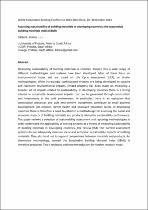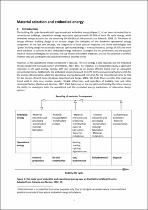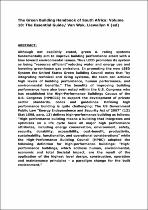 ResearchSpace
ResearchSpace
Assessing sustainability of building materials in developing countries: the sustainable building materials index (SBMI)
JavaScript is disabled for your browser. Some features of this site may not work without it.
- ResearchSpace
- →
- Research Publications/Outputs
- →
- Conference Publications
- →
- View Item
| dc.contributor.author |
Gibberd, Jeremy T

|
|
| dc.date.accessioned | 2015-05-25T10:51:08Z | |
| dc.date.available | 2015-05-25T10:51:08Z | |
| dc.date.issued | 2014-10 | |
| dc.identifier.citation | Gibberd, J.T.2014. Assessing sustainability of building materials in developing countries: the sustainable building materials index (SBMI). World Sustainable Building Conference 2014, Barcelona, 28 -30 October 2014, pp 1-13 | en_US |
| dc.identifier.uri | http://hdl.handle.net/10204/7972 | |
| dc.description | World Sustainable Building Conference 2014, Barcelona, 28 -30 October 2014. Due to copyright restrictions, the attached PDF file only contains the abstract of the full text item. For access to the full text item, please consult the publisher's website. | en_US |
| dc.description.abstract | Measuring sustainability of building materials is complex. Despite this a wide range of different methodologies and systems have been developed. Most of these focus on environmental issues and are based on Life Cycle Assessment (LCA), or similar methodologies. While increasingly sophisticated systems are being developed to capture and represent environmental impacts, limited progress has been made on measuring a broader set of impacts related to sustainability. In developing countries there is a strong interest in sustainable development impacts that can be generated through construction and investments in the built environment. In particular, there is an aspiration that construction processes and built environment investments contribute to small business development, job creation, better health and improved education levels. In developing countries there is therefore a need to establish a methodology for assessing the social and economic impacts of building materials and products related to sustainability performance. This paper reviews a selection of sustainability assessment and reporting methodologies in order understand the applicability of existing systems as a means of measuring sustainability of building materials in developing countries. The review finds that current assessment systems do not adequately measure social and economic sustainability impacts of building materials. They also tend not to support comparisons between materials and products. An alternative methodology, termed the Sustainable Building Material Index (SBMI), is therefore proposed. This is reviewed and recommendations for further research made. | en_US |
| dc.language.iso | en | en_US |
| dc.relation.ispartofseries | Workflow;13847 | |
| dc.subject | Sustainable building materials index | en_US |
| dc.subject | SBMI | en_US |
| dc.subject | Building materials | en_US |
| dc.subject | Building sustainability | en_US |
| dc.subject | Life cycle assessment | en_US |
| dc.subject | LCA | en_US |
| dc.title | Assessing sustainability of building materials in developing countries: the sustainable building materials index (SBMI) | en_US |
| dc.type | Conference Presentation | en_US |
| dc.identifier.apacitation | Gibberd, J. T. (2014). Assessing sustainability of building materials in developing countries: the sustainable building materials index (SBMI). http://hdl.handle.net/10204/7972 | en_ZA |
| dc.identifier.chicagocitation | Gibberd, Jeremy T. "Assessing sustainability of building materials in developing countries: the sustainable building materials index (SBMI)." (2014): http://hdl.handle.net/10204/7972 | en_ZA |
| dc.identifier.vancouvercitation | Gibberd JT, Assessing sustainability of building materials in developing countries: the sustainable building materials index (SBMI); 2014. http://hdl.handle.net/10204/7972 . | en_ZA |
| dc.identifier.ris | TY - Conference Presentation AU - Gibberd, Jeremy T AB - Measuring sustainability of building materials is complex. Despite this a wide range of different methodologies and systems have been developed. Most of these focus on environmental issues and are based on Life Cycle Assessment (LCA), or similar methodologies. While increasingly sophisticated systems are being developed to capture and represent environmental impacts, limited progress has been made on measuring a broader set of impacts related to sustainability. In developing countries there is a strong interest in sustainable development impacts that can be generated through construction and investments in the built environment. In particular, there is an aspiration that construction processes and built environment investments contribute to small business development, job creation, better health and improved education levels. In developing countries there is therefore a need to establish a methodology for assessing the social and economic impacts of building materials and products related to sustainability performance. This paper reviews a selection of sustainability assessment and reporting methodologies in order understand the applicability of existing systems as a means of measuring sustainability of building materials in developing countries. The review finds that current assessment systems do not adequately measure social and economic sustainability impacts of building materials. They also tend not to support comparisons between materials and products. An alternative methodology, termed the Sustainable Building Material Index (SBMI), is therefore proposed. This is reviewed and recommendations for further research made. DA - 2014-10 DB - ResearchSpace DP - CSIR KW - Sustainable building materials index KW - SBMI KW - Building materials KW - Building sustainability KW - Life cycle assessment KW - LCA LK - https://researchspace.csir.co.za PY - 2014 T1 - Assessing sustainability of building materials in developing countries: the sustainable building materials index (SBMI) TI - Assessing sustainability of building materials in developing countries: the sustainable building materials index (SBMI) UR - http://hdl.handle.net/10204/7972 ER - | en_ZA |








